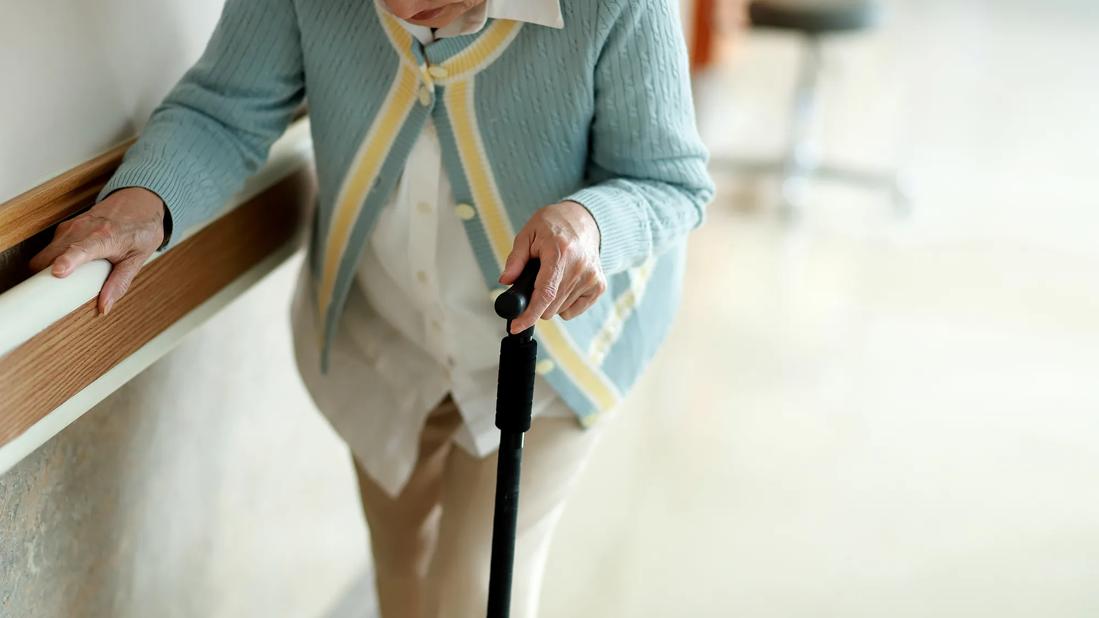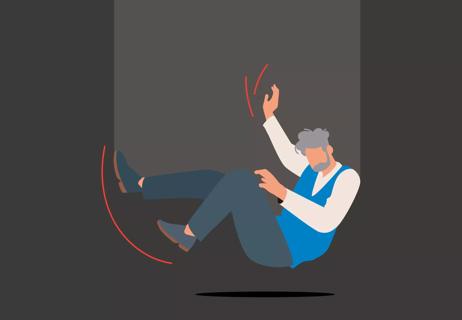Advertisement
Assistive devices, home modifications and regular check-ups are just a few ways you can protect yourself

It doesn’t matter if you’re 5 or 95: Falling is scary. But as we get older, the risk of a fall causing serious injury — or even death — goes up. That’s why it’s so important to take this health hazard seriously.
Advertisement
Cleveland Clinic is a non-profit academic medical center. Advertising on our site helps support our mission. We do not endorse non-Cleveland Clinic products or services. Policy
Geriatric clinical nurse specialist Anne Vanderbilt, CNP, CNS, shares her top tips for preventing falls.
It’s important to know whether or not you’re at risk of falls, says Vanderbilt. If you’re over age 65, having four or more of these risk factors increases your likelihood of falling:
Other significant risk factors are:
Most falls are caused by a combination of risk factors. Vanderbilt recommends getting assessed for the first time when you turn 65 — earlier if you have chronic conditions that raise your risk. From there, most guidelines suggest you get screened at least once a year. Your provider will ask you these three questions:
If you answer “yes” to any of these three questions, Vanderbilt says you need additional medical attention.
Advertisement
“Don’t wait until you’ve fallen to have a fall risk assessment completed,” Vanderbilt urges. Falls are the leading cause of accidental death in people over the age of 65. Like getting a physical or a routine cancer screening, fall risk assessments are standard. They’re a precaution, not a judgment about your health or fitness.
Worrying about falling is understandable. So is the desire to maintain your current lifestyle. Being proactive about prevention can keep you safe without cramping your style. Vanderbilt suggests that you:
Did you know that taking four or more medications, including over-the-counter ones, ups your chances of falling down? It’s true. There are lots of different kinds of drugs that can cause side effects like dizziness or drowsiness. Taking them together can sometimes make those symptoms worse.
Review everything you take with your providers at your medical appointments. They can confirm that the drugs you’re on are necessary and safe to take together. They’ll also address any side effects you’re experiencing.
Wearing specs that aren’t up to snuff is a contributing factor in many falls. A yearly eye exam will reveal whether your prescription needs to be adjusted. It also ensures that you catch eye health issues early.
“Getting your eyes checked every year is about more than just your vision,” Vanderbilt notes. “Sometimes, your eyes provide the first clue that you have an underlying health issue.” Eye doctors occasionally see signs of thyroid disease, aneurysms, cancers and more through routine screenings.
If you’re reading this, you’ve probably put the stilts and stilettos aside already. But going barefoot or padding around the house in stockings or socks can increase your fall risk, too.
Opt for non-skid footwear, like slipper socks with non-skid treads on the bottom.
If you have both hands full of groceries, you can’t use a handrail or cane to steady yourself. Use a backpack or take multiple trips instead. Slow and steady wins the race!
If you’re able, incorporate exercises into your routine that make your legs stronger and improve balance and flexibility. Examples include:
If you’re concerned about falling or recently fell, you may need to adjust your approach to exercise. Ask your provider if you’d benefit from working with a physical therapist or an occupational therapist.
Remember: Any movement is good movement, as far as your body’s concerned. As long as you’re getting your blood pumping and your body moving (and doing it safely), you’re reducing your risk of falling.
Advertisement
Scooters, reach extenders, walkers, sock assists, shower seats: There are assistive technologies out there to help with most daily activities. And using them can significantly reduce your risk of falling. But many people don’t take advantage of them. They assume they’re for somebody else, that they’re a sign of weakness or that using them means losing your independence.
Assistive devices aren’t just for people living with chronic illnesses or disabilities. They’re for everybody. And there’s no rule that says you have to use them all the time. These implements exist to help you be independent. And you get to use them on your terms.
The average house is chock full of tripping hazards that we take for granted. And most of them can be easily fixed! You can start by having someone:
The last thing you want to do is fall while fall-proofing your home. If you don’t have a friend or loved one nearby who can help, tell your provider. They can arrange for an occupational therapist to assess and address everyday hazards in your home.
Advertisement
Not all household hazards can be addressed with tape and an eye for organization. Sometimes, you need grab bars mounted, ramps built and non-slip flooring installed.
There are lots of different organizations, volunteer groups and grants designed to help people who are older or living with disabilities stay in their homes. You just have to know where to look.
If you live in the United States, you can visit the Home Modification Information Network website to learn about programs and providers in your area. If you live outside the U.S., ask your provider for advice. You won’t be the first person to ask!
Believe it or not, a strong social network of family and friends can mean fewer falls.
Whether or not you feel lonely, it’s important to let your providers know if you’re not getting much social interaction. Isolation raises your risk of falling and a host of other health issues, so they’ll direct you to services that get plugged in to community groups, volunteer opportunities, social clubs and more.
Life doesn’t stop when the weather gets bad. But there are lots of little adjustments you can make to reduce your risk of falling.
If it’s raining, for example, using a ride-share service or taxi means skipping the long walk through a wet movie theater parking lot. And if you’re out of a few essentials? Use a grocery, restaurant or pharmacy delivery service to avoid an unnecessary errand.
Advertisement
No matter how proactive you are about fall prevention, accidents do happen. And the experience can take an emotional toll. But your healthcare providers are here to get you on the road to recovery.
But what if you walk away from a fall uninjured? You might be tempted to pretend it never happened. And you’re not alone. One out of every four people over age 65 living in the U.S. falls each year. And fewer than half of them tell their providers.
Vanderbilt urges you to make a different choice.
When you tell your provider about a tumble, they can check for hidden injuries and underlying medical causes. They’re trained to see patterns and warning signs the rest of us might miss. They’re also a gateway to all kinds of medical and community support services that can help prevent future falls.
Whether you’ve never fallen before or you’re still dusting yourself off, being proactive about fall risk and prevention is key to staying safe and independent.
Learn more about our editorial process.
Advertisement

Staying active and doing what you love may increase both your confidence and your balance

First, take a deep breath — it happens more than you might think

Exercising and stretching your lower back, hamstrings, hips and quads can greatly improve your physical well-being

Many chronic conditions can cause fatigue — but don’t overlook mental health concerns, iron level and hormones

Some osteoporosis medications help slow bone breakdown, while others help grow new bone — what’s best for you depends on your needs

Use a gentle, nonjudgmental tone, focus on prevention and reassure them that age-related memory issues can have a variety of causes

From influenza and COVID-19 to pneumococcal, shingles and more, vaccines help keep you healthy

If you’re frequently dealing with short-term memory loss, confusion or issues around spatial awareness, you may need to see a neurologist

If you’re feeling short of breath, sleep can be tough — propping yourself up or sleeping on your side may help

If you fear the unknown or find yourself needing reassurance often, you may identify with this attachment style

If you’re looking to boost your gut health, it’s better to get fiber from whole foods